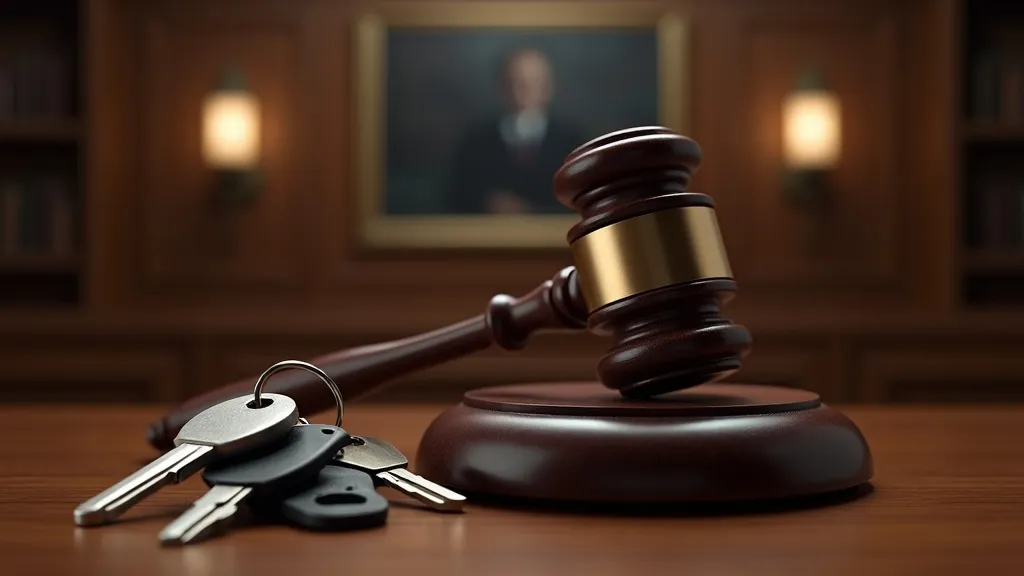Understanding Wrongful Repossession
Wrongful repossession occurs when a creditor unlawfully seizes property from a debtor. This complex legal issue often involves disputes over contract breaches, notification failures, or miscommunication. Understanding your rights and legal recourse can help navigate these situations effectively, ensuring protection against unjust asset recovery practices.

Introduction to Wrongful Repossession
In today’s financial landscape, the term "wrongful repossession" frequently emerges in discussions surrounding creditor-debtor relationships. At its core, wrongful repossession refers to the illegal or unauthorized seizure of property, typically involving vehicles, by a lender or financial institution. This article delves into the intricacies of wrongful repossession, exploring its causes, impacts, and the legal avenues available to affected individuals. With the growing complexity of financial agreements and the heightened stakes involved, understanding wrongful repossession is essential for both borrowers and lenders.
The Mechanics of Repossession
Repossession is a legal process where a creditor reclaims property due to the borrower's failure to comply with the terms of a loan agreement. Typically associated with auto loans, repossession can occur without prior warning if the contract specifies such conditions. However, strict regulations govern this process, ensuring that creditors adhere to fair practices. For example, the Fair Debt Collection Practices Act (FDCPA) imposes restrictions on how creditors can collect debts and conduct repossessions, further protecting consumers from potential abuses.
What Constitutes Wrongful Repossession?
Wrongful repossession arises when a creditor violates legal standards or breaches the contract terms during the repossession process. Common scenarios include:
- Lack of Proper Notification: Creditors must often provide debtors with adequate notice before reclaiming property. This notification is intended to give the borrower an opportunity to rectify their default status before the property is taken away.
- Breach of Peace: Any repossession that involves threats, physical force, or damage to property is considered unlawful. For instance, if a repossession agent uses force to enter a property or intimidates the debtor, it constitutes a breach of peace.
- Errors in Account Status: Repossessions based on incorrect information regarding payment status or loan default. A creditor may mistakenly believe a borrower is in default due to clerical errors, which can lead to wrongful repossession.
- Failure to Adhere to Grace Periods: Many loan agreements include a grace period following a missed payment. If a creditor repossesses the property before this period expires, it may be deemed illegal.
- Unlawful Entry: Repossession agents must not trespass or enter property without permission. If they do so without consent, it can lead to claims of wrongful repossession.
Legal Framework and Protections
Understanding the legal protections against wrongful repossession is crucial. The Uniform Commercial Code (UCC) provides a legal framework across many states, outlining creditor responsibilities and debtor rights. This code governs secured transactions and establishes the rights of both parties in the event of default. Additionally, state-specific laws may offer further protections, emphasizing the need for borrowers to acquaint themselves with local regulations. For instance, some states require creditors to obtain a court order before repossessing a vehicle, while others may impose stricter standards on how repossessions can be conducted.
Steps to Take If Wrongfully Repossessed
If you believe your property has been wrongfully repossessed, consider the following steps:
- Review Your Contract: Thoroughly examine your loan agreement to verify compliance with repossession terms. Look for sections detailing the conditions under which the creditor may repossess the property and any stipulations regarding notification.
- Gather Evidence: Compile documentation such as payment records, notices received, and any correspondence with the lender. This evidence is crucial for supporting your claim of wrongful repossession.
- Contact the Creditor: Initiate communication to resolve the issue directly, ensuring to document all interactions. Keep records of phone calls, emails, and any other form of communication regarding the repossession.
- Consult Legal Counsel: Seek professional legal advice to understand your rights and potential legal actions. An attorney specializing in consumer protection or repossession law can provide valuable guidance.
- File a Complaint: If unresolved, file a complaint with relevant consumer protection agencies or consider litigation. Agencies like the Consumer Financial Protection Bureau (CFPB) can assist in mediating disputes between consumers and creditors.
Additionally, it is beneficial to understand the potential outcomes of your claim. Depending on the circumstances, you could recover your property, seek monetary damages, or even receive compensation for legal fees incurred during the process.
Prevention and Awareness
Preventing wrongful repossession begins with awareness and proactive financial management. Regularly review loan agreements, maintain clear communication with creditors, and promptly address any financial difficulties. Additionally, understanding the signs of potential repossession can help mitigate risks. For example, if you are falling behind on payments, it is essential to communicate with your lender and explore options such as loan modification or deferment.
Moreover, consider implementing a financial monitoring system. Keeping track of your financial obligations and payment schedules can help you stay ahead of potential issues. This might include setting reminders for payment due dates and maintaining a budget that accounts for unexpected expenses that could affect your ability to pay on time.
Participating in financial literacy programs can also empower consumers. These programs often provide valuable information about managing credit and understanding the implications of defaulting on loans. By educating oneself about financial responsibilities and rights, individuals can avoid common pitfalls that lead to wrongful repossession.
Case Studies and Impact
Examining real-world instances of wrongful repossession highlights the profound impact on individuals' lives, from financial strain to emotional distress. One notable case involved a family who faced the repossession of their vehicle due to a clerical error by the lender, which mistakenly reported them as delinquent. The stress of losing their primary means of transportation significantly impacted their daily lives, including employment and childcare. After seeking legal counsel, they were able to recover their vehicle and receive compensation for damages caused by the wrongful repossession.
Another case involved an individual whose car was repossessed without proper notification. The creditor failed to inform the borrower about missed payments and did not provide an opportunity to rectify the situation. After a lengthy legal battle, the borrower not only regained possession of the vehicle but also received a settlement for emotional distress and financial losses incurred due to the repossession process.
These case studies underscore the importance of legal advocacy and the role of consumer protection agencies in addressing these grievances. They also highlight the severe emotional and financial toll that wrongful repossession can take on individuals, often leading to long-term consequences such as damaged credit scores and emotional trauma. It is crucial for individuals to be aware of their rights and the resources available to them in the event of wrongful repossession.
FAQs
- Can repossession occur without prior notice? While some contracts allow for immediate repossession, many require creditors to provide advance notice. Familiarizing yourself with your specific loan agreement is vital to understanding your rights in this regard.
- What constitutes a "breach of peace" during repossession? Any repossession involving threats, physical altercations, or property damage is considered a breach of peace. Creditors and their agents must conduct repossessions in a manner that does not disturb the peace or safety of the borrower.
- How can I contest a wrongful repossession? Begin by reviewing your loan agreement, gathering evidence, and consulting with legal counsel for guidance on possible actions. Additionally, consider filing a complaint with consumer protection agencies.
- Are there specific protections in my state? State laws vary, so it is essential to familiarize yourself with local statutes governing repossession practices. Understanding these laws can help you better navigate potential issues with creditors.
- What should I do if my property is repossessed? If your property is repossessed, immediately review your loan agreement, gather evidence, and reach out to the creditor to discuss your situation. Legal consultation is also highly recommended to explore your options.
Conclusion
Wrongful repossession presents significant challenges, highlighting the delicate balance between creditor rights and debtor protections. By understanding the legal landscape and remaining vigilant in financial dealings, individuals can better navigate these complexities, ensuring their rights are upheld and their property safeguarded. The journey toward resolving wrongful repossession can be daunting, but with the right knowledge and resources, affected individuals can advocate for themselves effectively. In conclusion, staying informed and proactive in financial matters is the key to preventing wrongful repossession and protecting one’s assets.
Further Considerations and Resources
In light of the complexities surrounding wrongful repossession, it is beneficial for individuals to familiarize themselves with additional resources that can provide support and information. Organizations such as the National Consumer Law Center (NCLC) offer valuable insights into consumer rights and the laws governing repossession practices. They provide access to educational materials and may even offer assistance in navigating disputes with creditors.
Additionally, local consumer protection agencies can be a helpful first point of contact for those facing wrongful repossession. These agencies often have the necessary expertise to guide individuals through the complaint process and may assist in mediating disputes with creditors. Furthermore, many community organizations and non-profits provide financial counseling services, helping individuals develop better budgeting skills and financial management practices.
For those considering legal action, finding an attorney with a specialization in consumer protection or repossession law is crucial. Such professionals can offer tailored advice and strategies based on the specifics of a case. Many attorneys offer free initial consultations, allowing individuals to understand their options without incurring immediate costs.
The Emotional Toll of Wrongful Repossession
Beyond the legal and financial implications, wrongful repossession can take a significant emotional toll on individuals and families. The stress associated with losing a vehicle or property can lead to anxiety, depression, and a sense of helplessness. It is essential for affected individuals to recognize the emotional impact and seek support as needed. Connecting with support groups, counseling services, or even speaking to friends and family can help mitigate feelings of isolation and distress.
Moreover, sharing experiences with others who have faced similar challenges can be empowering. Many online forums and communities exist where individuals can discuss their experiences and exchange advice on navigating the complexities of wrongful repossession. These platforms can provide both emotional support and practical tips for those in similar situations.
Long-term Implications of Wrongful Repossession
The long-term implications of wrongful repossession extend beyond immediate financial and emotional distress. Individuals may experience lasting damage to their credit scores, making it challenging to secure loans or credit in the future. This can lead to higher interest rates on subsequent loans and potential difficulties in obtaining housing or employment, as many landlords and employers conduct credit checks.
Additionally, the experience of wrongful repossession can instill a sense of distrust toward financial institutions and lenders. This lack of trust can hinder individuals from seeking necessary financial assistance in the future, perpetuating a cycle of financial insecurity. It is vital for individuals to rebuild their credit and confidence by engaging with reputable financial institutions and seeking out educational resources to improve their financial literacy.
Conclusion and Call to Action
In conclusion, wrongful repossession is a significant issue that affects many individuals across the nation. By understanding the legal framework, recognizing the signs of wrongful repossession, and taking proactive steps to safeguard their rights, individuals can better protect themselves from the harsh realities of losing property unjustly. Legal advocacy, community support, and financial education are essential tools for navigating this complex landscape.
It is crucial for anyone facing potential repossession or who has been wrongfully repossessed to take action. Whether it involves consulting with legal counsel, communicating with creditors, or seeking support from consumer protection agencies, individuals should feel empowered to advocate for their rights. The journey may be challenging, but with the right resources and knowledge, recovery and resolution are possible.
-
1

Explore Thrilling Adventures: Unveil the World's Very Exciting Travel Destinations
-
2

Unlock the Secrets to Maximize Your Kona SUV's Fuel Economy
-
3

Unlock the Highest Resale Profit: Expert Tips for Boosting Your Kona SUV's Value
-
4

Effortless Adaptation to Senior Apartment Living: Master the Transition with This Ultimate Strategy
-
5

Transform Your Senior Apartment into a Cozy and Charming Retreat: Personalized Touches to Make It Truly Home









